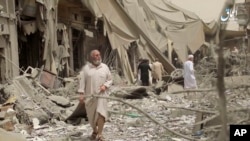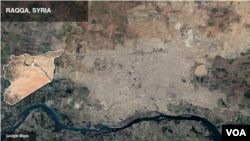Islamic State jihadists struggled Tuesday to remain in control of land in and around Raqqa after holding the territory for more than two years, a leader of U.S.-backed forces in Syria told VOA.
Mahmud Ismail, a senior commander in the Syrian Democratic Forces (SDF), said coalition forces had liberated "tens of villages and cities, including strategic Tabqa city and two major dams," since the U.S.-backed forces launched an offensive earlier in the day.
"Until today we have advanced slowly because the safety of the civilians is very important for us, and we have taken every measure to ensure the life of civilians," he said. But he added that the SDF had "momentum" and that IS could not resist as it once did.
The SDF has been working since November to encircle Raqqa, the de facto capital of Islamic State, which the militants have held since 2014.
Boats destroyed
According to the Reuters news agency, coalition fighters destroyed nearly 20 boats that IS was using to ferry jihadists across the Euphrates to join the fight.
Spokesman Colonel Ryan Dillon told Reuters the coalition used both air and artillery strikes to aid in the initial assault on Raqqa, taking out at least 12 fighting positions and dozens of vehicles.
"This is not the first time we have struck barges and watercraft that have moved across the river to support the operations that ISIS is doing in and around Raqqa," he told Reuters, using another Islamic State acronym.
Lieutenant General Steve Townsend, who commands the U.S.-led coalition fighting Islamic State in Syria and Iraq, said the battle for Raqqa would be long and difficult, but will "deliver a decisive blow" to IS's claim of holding a physical caliphate, according to a coalition statement.
"It's hard to convince new recruits that ISIS is a winning cause when they just lost their twin 'capitals' in both Iraq and Syria," Townsend said.
Iraqi forces, with coalition support, are also working to oust the remaining Islamic State fighters from their main Iraqi stronghold of Mosul.
The coalition said in its statement that it would continue providing equipment, training, intelligence and logistical support to the SDF during the Raqqa offensive, and that the SDF had encouraged civilians to leave the city.
The Britain-based Syrian Observatory for Human Rights, which monitors the war in Syria, said Tuesday that SDF fighters had attacked both the eastern edge of Raqqa and a military base on the northern side of the city.
Raqqa has been the subject of intense speculation and tension among the various entities fighting in Syria, with the government and SDF expressing a desire to lead the fighting, and Turkey opposing the role of the SDF and its large contingent of Kurdish fighters whom Turkish officials consider terrorists.
The U.S.-led coalition said the SDF had indicated that when Raqqa was retaken, it would be turned over to local civilians, not held by the group.
Syria analyst David Lesch, a history professor at Trinity University in San Antonio, Texas, said the issue of who was in charge would be a key issue going forward.
"Many, many questions still remain to be answered, and still will probably be the subject of a diplomatic battle in terms of who controls Raqqa once it is liberated," he told VOA. "Will it be the Syrian Democratic Forces? Will turkey have a role? Will the Syrian regime have a role? What will Russia do in this case?"






